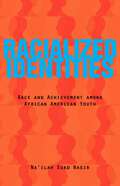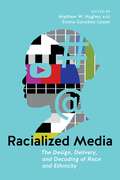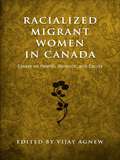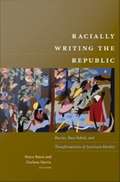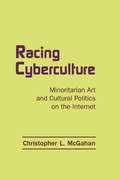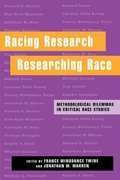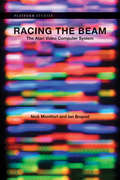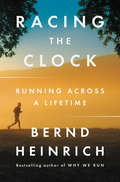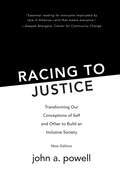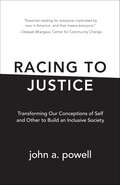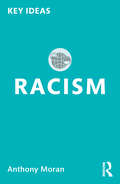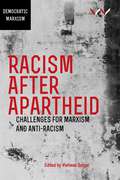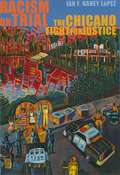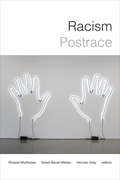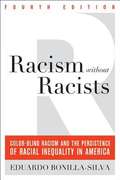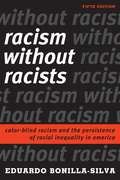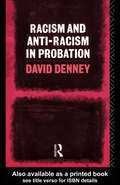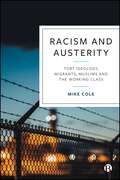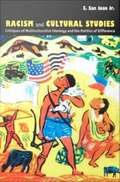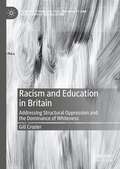- Table View
- List View
Racialized Identities
by Na'Ilah Suad NasirAs students navigate learning and begin to establish a sense of self, local surroundings can have a major influence on the range of choices they make about who they are and who they want to be. This book investigates how various constructions of identity can influence educational achievement for African American students, both within and outside school. Unique in its attention to the challenges that social and educational stratification pose, as well as to the opportunities that extracurricular activities can offer for African American students' access to learning, this book brings a deeper understanding of the local and fluid aspects of academic, racial, and ethnic identities. Exploring agency, personal sense-making, and social processes, this book contributes a strong new voice to the growing conversation on the relationship between identity and achievement for African American youth.
Racialized Media: The Design, Delivery, and Decoding of Race and Ethnicity (Goldstein-Goren American Jewish History)
by Matthew W. Hughey and Emma González-LesserHow media propagates and challenges racismFrom Black Panther to #OscarsSoWhite, the concept of “race,” and how it is represented in media, has continued to attract attention in the public eye. In Racialized Media, Matthew W. Hughey, Emma González-Lesser, and the contributors to this important new collection of original essays provide a blueprint to this new, ever-changing media landscape.With sweeping breadth, contributors examine a number of different mediums, including film, television, books, newspapers, social media, video games, and comics. Each chapter explores the impact of contemporary media on racial politics, culture, and meaning in society. Focusing on producers, gatekeepers, and consumers of media, this book offers an inside look at our media-saturated world, and the impact it has on our understanding of race, ethnicity, and more. Through an interdisciplinary lens, Racialized Media provides a much-needed look at the role of race and ethnicity in all phases of media production, distribution, and reception.
Racialized Migrant Women in Canada: Essays on Health, Violence and Equity
by Vijay AgnewDespite legislative guarantees of equality, immigrant women in Canada often experience many forms of prejudice in their everyday lives. Racialized Migrant Women in Canada delves into the public and private spheres of several distinct communities in order to expose the underlying inequalities within Canada's economic, social, legal, and political systems that frequently result in the denial of basic rights to migrant women.Using interdisciplinary approaches drawn from the areas of sociology, law, health studies, and political science, the essays in this volume cover diverse topics such as the social construction of Muslim women, access to health care, and violence against women. The contributors base their work not only in cities with large immigrant populations but also in areas less densely populated with immigrants, revealing regional disparities in regard to economic opportunity and social services.
Racially Writing the Republic: Racists, Race Rebels, and Transformations of American Identity
by Bruce Baum Duchess HarrisRacially Writing the Republic investigates the central role of race in the construction and transformation of American national identity from the Revolutionary War era to the height of the civil rights movement. Drawing on political theory, American studies, critical race theory, and gender studies, the contributors to this collection highlight the assumptions of white (and often male) supremacy underlying the thought and actions of major U. S. political and social leaders. At the same time, they examine how nonwhite writers and activists have struggled against racism and for the full realization of America's political ideals. The essays are arranged chronologically by subject, and, with one exception, each essay is focused on a single figure, from George Washington to James Baldwin. The contributors analyze Thomas Jefferson's legacy in light of his sexual relationship with his slave, Sally Hemings; the way that Samuel Gompers, the first president of the American Federation of Labor, rallied his organization against Chinese immigrant workers; and the eugenicist origins of the early-twentieth-century birth-control movement led by Margaret Sanger. They draw attention to the writing of Sarah Winnemucca, a Northern Piute and one of the first published Native American authors; the anti-lynching activist Ida B. Wells-Barnett; the Filipino American writer Carlos Bulosan; and the playwright Lorraine Hansberry, who linked civil rights struggles in the United States to anticolonial efforts abroad. Other figures considered include Alexis de Tocqueville and his traveling companion Gustave de Beaumont, Juan Nepomuceno Cortina (who fought against Anglo American expansion in what is now Texas), Abraham Lincoln, Theodore Roosevelt, and W. E. B. Du Bois. In the afterword, George Lipsitz reflects on U. S. racial politics since 1965. Contributors. Bruce Baum, Cari M. Carpenter, Gary Gerstle, Duchess Harris, Catherine A. Holland, Allan Punzalan Isaac, Laura Janara, Ben Keppel, George Lipsitz, Gwendolyn Mink, Joel Olson, Dorothy Roberts, Patricia A. Schechter, John Kuo Wei Tchen, Jerry Thompson
Racing Cyberculture: Minoritarian Art and Cultural Politics on the Internet (Routledge Studies in New Media and Cyberculture #3)
by Christopher L. McGahanRacing Cyberculture explores new media art that challenges the 'race-blind' myth of cyberspace. The particular cultural workers whose productions are addressed are the performance and installation artist Guillermo Gomez-Pena and Roberto Sifuentes, the UK new media arts collective Mongrel, the conceptual artists and composer Keith Obadike, and the multimedia artist Prema Murthy. The author looks at how works by these artists bring forward questions of racial and cultural identity as they intersect with information technology.
Racing Research, Researching Race
by Jonathan Warren France Winddance TwineA white woman studies upper-class eighth grade girls at her alma mater on Long Island and finds a culture founded on misinformation about its own racial and class identity. A black American researcher is repeatedly assumed by many Brazilian subjects to be a domestic servant or sex worker. Racing Race, Researching Race is the first volume of its kind to explore how ideologies of race and racism intersect with nationality and gender to shape the research experience. Critical work in race studies has not adequately addressed how racial positions in the field--as inflected by nationality, gender, and age--generate numerous methodological dilemmas. Racing Research, Researching Race begins to fill this gap by infusing critical race studies with more empirical work and suggesting how a critical race perspective might improve research methodologies and outcomes. The contributors to the volume encompass a wide range of disciplinary backgrounds including anthropology, sociology, ethnic studies, women=s studies, political science, and Asian American studies.
Racing Research, Researching Race: Methodological Dilemmas in Critical Race Studies
by Jonathan Warren France Winddance TwineAt a time when historians are reaching for new approaches to understanding the hidden life of working-class European families, this study of family life and work explores some of social history's most pressing questions in a compelling and lucid way. --Leslie Page MochUniversity of Michigan, Flint As the industrial revolution swept through towns and villages, it radically altered traditional ways of life, dramatically transforming the family unit. The greater economic and social role of women, the changing relationship between parents and children, and the decline of masculine power all played a role in the perceived crisis of the family. Increases in crime, infanticide, abortion, poverty, and the use of birth control all heightened the concern about the destruction of the family. By the late nineteenth century, communities throughout Europe and the United States witnessed a deliberate limitation of family size. This fall in family size resulted, Karl Ittman argues, not from newfound prosperity or the universality of Victorian values, but rather from the need for families to protect themselves from the uncertainties of modern life. This uncoupling of sexuality and reproduction sent shock waves through western societies that still resonate today. Many of these same issues have appeared in the contemporary American debate over family values. Focusing on West Yorkshire, England, in the latter half of the 19th century, Ittman illuminates the many social, personal, and familial crises brought on by the industrial revolution.
Racing Uphill: Confronting a Life with Epilepsy
by Stacia KalinoskiThe candid, inspiring story of a woman&’s experience with a chronic, unpredictable neurological condition When twenty-nine-year-old reporter Stacia Kalinoski regained consciousness on a couch at the TV station where she worked, she assumed that she&’d had another seizure. But the electrical storm that had just torn through her brain was more destructive than she could have imagined, and the broadcast journalism career she loved swiftly came to an end. Forced to confront the reality of her medical condition, Kalinoski made the risky decision to undergo brain surgery, targeting the epilepsy that was ravaging her life. In Racing Uphill, Kalinoski describes the seizures that occurred while she was running, which led to her pursuit of an uncertain cure. Rallying the grit she developed as an athlete and engaging the research and reporting skills she acquired as a journalist, she gives us a rare inside look at the ways epilepsy can change a life. Moving beyond her own personal experience, Kalinoski interviews prominent epileptologists to understand how seizures can spread, steal memories, and create strange behaviors and mood disorders. She seamlessly joins what she learned from her research with her own story, offering valuable insight into the experience of grappling with a relentless neurological disease. The vivid auras that preceded seizures and the damage that followed; the toll of her epilepsy on her family and loved ones; the extraordinary determination her reckoning required—these are all part of Kalinoski&’s story of adversity, denial, acceptance, and resilience. In sharing the remarkable opportunity that epilepsy presented for her courage and growth, Stacia Kalinoski speaks to anyone facing an uphill battle and offers inspiration for taking control of one&’s own health.
Racing the Beam: The Atari Video Computer System (Platform Studies)
by Nick Montfort Ian BogostA study of the relationship between platform and creative expression in the Atari VCS.The Atari Video Computer System dominated the home video game market so completely that “Atari” became the generic term for a video game console. The Atari VCS was affordable and offered the flexibility of changeable cartridges. Nearly a thousand of these were created, the most significant of which established new techniques, mechanics, and even entire genres. This book offers a detailed and accessible study of this influential video game console from both computational and cultural perspectives. Studies of digital media have rarely investigated platforms—the systems underlying computing. This book (the first in a series of Platform Studies) does so, developing a critical approach that examines the relationship between platforms and creative expression. Nick Montfort and Ian Bogost discuss the Atari VCS itself and examine in detail six game cartridges: Combat, Adventure, Pac-Man, Yars' Revenge, Pitfall!, and Star Wars: The Empire Strikes Back. They describe the technical constraints and affordances of the system and track developments in programming, gameplay, interface, and aesthetics. Adventure, for example, was the first game to represent a virtual space larger than the screen (anticipating the boundless virtual spaces of such later games as World of Warcraft and Grand Theft Auto), by allowing the player to walk off one side into another space; and Star Wars: The Empire Strikes Back was an early instance of interaction between media properties and video games. Montfort and Bogost show that the Atari VCS—often considered merely a retro fetish object—is an essential part of the history of video games.
Racing the Clock: Running Across a Lifetime
by Bernd HeinrichAn award-winning, much-loved biologist turns his gaze on himself, using his long-distance running to illuminate the changes to a human body over a lifetimePart memoir, part scientific investigation, Racing the Clock is the book biologist and natural historian Bernd Heinrich has been waiting his entire life to write. A dedicated and accomplished marathon (and ultra-marathon) runner who won his first marathon at age thirty-nine, Heinrich looks deeply at running, aging, and the body, exploring the unresolved relationship between metabolism, diet, exercise, and age. Why do some bodies age differently than others? How much control do we have over that process and what effect, if any, does being active have? Bringing to bear research from his entire career and in the spirit of his classic Why We Run, Heinrich probes the questions of how we use energy and continue to adapt to our mutable surroundings and circumstances. Beyond that, he examines how our bodies change while we age but also how we can work with, if not overcome, many of these changes—and what all this tells us about evolution and the mechanisms of life, health, and happiness.Racing the Clock offers fascinating and surprising conclusions, all while bringing the reader along on Heinrich’s compelling journey to what he says will be his final race—a fifty-kilometer race at age eighty.
Racing to Justice: Transforming Our Conceptions of Self and Other to Build an Inclusive Society
by john a powellIn Racing to Justice, renowned social justice advocate john a. powell persuasively argues that we have yet to achieve a truly post-racial society and that there is much work to be done to redeem the American promise of inclusive democracy.Gathered from a decade of writing about social justice and spirituality, these meditations on race, identity, and social policy provide an outline for laying claim to our shared humanity and a way toward healing ourselves and securing our future. With an updated foreword and a new chapter on polarization, this new edition continues to challenge us to replace the attitudes and institutions that promote and perpetuate social suffering with those that foster relationships and a way of being that transcends disconnection and separation.Racing to Justice is a thought-provoking book that offers readers a look into the issues that continue to plague our society. It is reminder that we have yet to address and reckon with the challenges we face in providing equal opportunities for all people in this country and the world.
Racing to Justice: Transforming Our Conceptions of Self and Other to Build an Inclusive Society
by john a. powellRenowned social justice advocate john a. powell persuasively argues that we have not achieved a post-racial society and that there is much work to do to redeem the American promise of inclusive democracy. Culled from a decade of writing about social justice and spirituality, these meditations on race, identity, and social policy provide an outline for laying claim to our shared humanity and a way toward healing ourselves and securing our future. Racing to Justice challenges us to replace attitudes and institutions that promote and perpetuate social suffering with those that foster relationships and a way of being that transcends disconnection and separation.
Racism
by Albert MemmiAn eminent social analyst examines the way racism works-and how it can be overcome.Racism: It is social, not &“natural&”; it is general, not &“personal&”; and it is tragically effective. In a remarkable meditation on a subject at the troubled center of American life, Albert Memmi investigates racism as social pathology-a cultural disease that prevails because it allows one segment of society to empower itself at the expense of another. By turns historical, sociological, and autobiographical, Racism moves beyond individual prejudice and taste to engage the broader questions of collective behavior and social responsibility.The book comprises three sections-&“Description,&” &“Definition,&” and &“Treatment&”-in which Memmi delineates racism&’s causes and hidden workings, examines its close affinity to colonialism, and considers its everyday manifestations over a period of centuries throughout the West.For Memmi, the structure of racism has four &“moments&”: the insistence on difference; the negative valuation imposed on those who differ; the generalizing of this negative valuation to an entire group; and the use of generalization to legitimize hostility. Memmi shows how it is not racism&’s content-which can change at will-but its form that gives it such power and tenacity.Born in a poor section of Tunis, Tunisia, a Jew among Muslims, an Arab among Europeans, Memmi brings his own experience of the complex contours of prejudice to his analysis of a problem that divides societies the world over. Writing in the tradition of Frantz Fanon, Memmi redirects debates about racism-and offers a rare chance for progress against social prejudice.
Racism (Key Ideas)
by Anthony MoranRacism has a long history and its devastating impacts continue to spark heated, moral and political debate and give rise to social movements and widespread protest. This accessible primer provides a cogent introduction to the study and confrontation of racism in the twenty-first century, making use of key insights from sociology and other social sciences. Drawing on a range of scholars, including from the radical black tradition and the Global South, this book explores key issues in racism studies. Putting racism into historical context, Moran explains the modernity of racism and its creation through European colonialism and imperialism, racial capitalism, and the development of racist hierarchies stimulated by colonialist exploitation as well as pseudoscientific and Enlightenment thinking centred upon white supremacy. Moran also discusses the intersectional, structural, institutional and systemic nature of racism, and the connections between race, racism and nationalism evident in the explosion of right-wing nationalist populism around the world. The book also investigates how the self and subjectivity are involved in racism and contribute to the reproduction of racism as a system, before considering whether there are new, cultural forms of racism, and how we can account for Islamophobia and other racisms described as new, such as colour-blind racism, post-racial racism and racism without racists. Crucially, the book explores anti-racist social movements (such as Black Lives Matter) and how racism has been challenged, and discusses how accounts of race and racism can be given without reproducing the category of race as a ‘natural’ organiser of people, groups, and identities. This book will appeal to the general reader and students in the humanities and social sciences with an interest in the continuing impact of racism, racial identities, migration, multiculturalism, ethnic and racial studies, nationalism and identity studies.
Racism After Apartheid: Challenges for Marxism and Anti-Racism
by Vishwas SatgarRacism after Apartheid, volume four of the Democratic Marxism series, brings together leading scholars and activists from around the world studying and challenging racism. In eleven thematically rich and conceptually informed chapters, the contributors interrogate the complex nexus of questions surrounding race and relations of oppression as they are played out in the global South and global North. Their work challenges Marxism and anti-racism to take these lived realities seriously and consistently struggle to build human solidarities.
Racism On Trial: The Chicano Fight For Justice
by Ian Haney LópezIn 1968, ten thousand students marched in protest over the terrible conditions prevalent in the high schools of East Los Angeles, the largest Mexican community in the United States. <P><P>Chanting "Chicano Power," the young insurgents not only demanded change but heralded a new racial politics. Frustrated with the previous generation's efforts to win equal treatment by portraying themselves as racially white, the Chicano protesters demanded justice as proud members of a brown race. <P>The legacy of this fundamental shift continues to this day. Ian Haney López tells the compelling story of the Chicano movement in Los Angeles by following two criminal trials, including one arising from the student walkouts. He demonstrates how racial prejudice led to police brutality and judicial discrimination that in turn spurred Chicano militancy. He also shows that legal violence helped to convince Chicano activists that they were nonwhite, thereby encouraging their use of racial ideas to redefine their aspirations, culture, and selves. <P>In a groundbreaking advance that further connects legal racism and racial politics, Haney López describes how race functions as "common sense," a set of ideas that we take for granted in our daily lives. This racial common sense, Haney López argues, largely explains why racism and racial affiliation persist today. By tracing the fluid position of Mexican Americans on the divide between white and nonwhite, describing the role of legal violence in producing racial identities, and detailing the commonsense nature of race, Haney López offers a much needed, potentially liberating way to rethink race in the United States.
Racism Postrace
by Sarah Banet-Weiser Roopali Mukherjee Herman GrayWith the election of Barack Obama, the idea that American society had become postracial—that is, race was no longer a main factor in influencing and structuring people's lives—took hold in public consciousness, increasingly accepted by many. The contributors to Racism Postrace examine the concept of postrace and its powerful history and allure, showing how proclamations of a postracial society further normalize racism and obscure structural antiblackness. They trace expressions of postrace over and through a wide variety of cultural texts, events, and people, from sports (LeBron James's move to Miami), music (Pharrell Williams's “Happy”), and television (The Voice and HGTV) to public policy debates, academic disputes, and technology industries. Outlining how postrace ideologies confound struggles for racial justice and equality, the contributors open up new critical avenues for understanding the powerful cultural, discursive, and material conditions that render postrace the racial project of our time. Contributors. Inna Arzumanova, Sarah Banet-Weiser, Aymer Jean Christian, Kevin Fellezs, Roderick A. Ferguson, Herman Gray, Eva C. Hageman, Daniel Martinez HoSang, Victoria E. Johnson, Joseph Lowndes, Roopali Mukherjee, Safiya Umoja Noble, Radhika Parameswaran, Sarah T. Roberts, Catherine R. Squires, Brandi Thompson Summers, Karen Tongson, Cynthia A. Young
Racism Without Racists: Color-Blind Racism and the Persistence of Racial Inequality in America
by Eduardo Bonilla-SilvaEduardo Bonilla-Silva s acclaimed Racism without Racists documents how beneath our contemporary conversation about race lies a full-blown arsenal of arguments, phrases, and stories that whites use to account for and ultimately justify racial inequalities. This provocative book explodes the belief that America is now a color-blind society. The fourth edition adds a chapter on what Bonilla-Silva calls "the new racism," which provides the essential foundation to explore issues of race and ethnicity in more depth. This edition also updates Bonilla-Silva s assessment of race in America after President Barack Obama s re-election. Obama s presidency, Bonilla-Silva argues, does not represent a sea change in race relations, but rather embodies disturbing racial trends of the past. In this fourth edition, Racism without Racists will continue to challenge readers and stimulate discussion about the state of race in America today. "
Racism Without Racists: Color-blind Racism And The Persistence Of Racial Inequality In America (Fifth Edition)
by Eduardo Bonilla-SilvaEduardo Bonilla-Silva's acclaimed Racism without Racists documents how, beneath our contemporary conversation about race, there lies a full-blown arsenal of arguments, phrases, and stories that whites use to account for--and ultimately justify--racial inequalities. <P><P>The fifth edition of this provocative book makes clear that color blind racism is as insidious now as ever. <P><P>It features new material on our current racial climate, including the Black Lives Matter movement; a significantly revised chapter that examines the Obama presidency, the 2016 election, and Trump's presidency; and a new chapter addressing what readers can do to confront racism--both personally and on a larger structural level.
Racism and African American Mental Health: Using Cognitive Behavior Therapy to Empower Healing (ISSN)
by Janeé M. SteeleRacism and African American Mental Health examines the psychological impacts of racism within the African American community and offers a culturally adapted model of cognitive behavior therapy for more culturally relevant case conceptualization and treatment planning with this population. Readers of this text will gain a greater understanding of how manifestations of racism contribute to the development of psychological distress among African Americans and learn specific strategies to address the negative automatic thoughts and maladaptive beliefs that develop in response to racism. Reflection questions and guided practice are incorporated throughout the text to assist readers with application of the strategies discussed in their own clinical settings.
Racism and Anti-Racism in Probation
by David DenneyRacism and Anti-Racism in Probation analyses the complex processes by which black people are treated differentially by the probation service. Drawing on detailed ethnographic material, David Denney shows how conventions used by probation officers can discriminate against black people. He considers the implications of recent changes in penal policy on the development of probation work and considers how future developments may lead to an anti-racist form of probation practice.
Racism and Austerity: Tory Ideology, Migrants, Muslims and the Working Class
by Mike ColeThis powerful book analyses racism within Britain’s Tory Party along with its immigration policies and imposition of austerity, exposing how 14 years of Tory rule deepened inequality and division. With vivid examples, from the Windrush scandal and Grenfell tragedy to Islamophobia, Cole reveals how “hostile environment” policies, the “age of austerity” and brutal budget cuts have shaped lives and communities. Combining sharp analysis with historical context, the book uncovers how these issues are deeply tied to capitalism and class struggles. In the light of the rise of the far right in Britain and offering both immediate solutions and a vision for systemic change, this crucial work challenges us to imagine a fairer, more compassionate society grounded in justice and solidarity.
Racism and Cultural Studies: Critiques of Multiculturalist Ideology and the Politics of Difference
by E. San Juan Jr.In Racism and Cultural Studies E. San Juan Jr. offers a historical-materialist critique of practices in multiculturalism and cultural studies. Rejecting contemporary theories of inclusion as affirmations of the capitalist status quo, San Juan envisions a future of politically equal and economically empowered citizens through the democratization of power and the socialization of property. Calling U. S. nationalism the new "opium of the masses," he argues that U. S. nationalism is where racist ideas and practices are formed, refined, and reproduced as common sense and consensus. Individual chapters engage the themes of ethnicity versus racism, gender inequality, sexuality, and the politics of identity configured with the discourse of postcoloniality and postmodernism. Questions of institutional racism, social justice, democratization, and international power relations between the center and the periphery are explored and analyzed. San Juan fashions a critique of dominant disciplinary approaches in the humanities and social sciences and contends that "the racism question" functions as a catalyst and point of departure for cultural critiques based on a radical democratic vision. He also asks urgent questions regarding globalization and the future of socialist transformation of "third world" peoples and others who face oppression. As one of the most notable cultural theorists in the United States today, San Juan presents a provocative challenge to the academy and other disciplinary institutions. His intervention will surely compel the attention of all engaged in intellectual exchanges where race/ethnicity serves as an urgent focus of concern.
Racism and Education in Britain: Addressing Structural Oppression and the Dominance of Whiteness (Palgrave Studies in Race, Inequality and Social Justice in Education)
by Gill CrozierThis book is concerned with racism and education in Britain. It aims to seek greater understanding of the nature and endurance of racism within education practice in the 21st century and to examine the relationship between racism and the educational experiences and outcomes of many Black, Asian and Minority Ethnic (BAME) children and young people, with reference to school and university. Employing Critical Race Theory, Critical Whiteness Theory and Intersectionality, this structural analysis traces the historical and contemporary development of racism in education. White privilege and White supremacy, it is argued, are central to the perpetuation of racism and the failure to either understand or recognise the systemic nature of racial oppression. The book focuses on Britain, but the analysis locates racism as a global phenomenon. In spite of decades of policies on ‘race’ equality in Britain, BAME children and young people continue to be discriminated against and are failed by the education system. Applying a theoretical analysis of racism and White supremacy and privilege to an examination of government policies and research in schools and universities, the nature and extent of racism is revealed in the educational experiences of young people.
Racism and Education in the U.K. and the U.S.
by Mike ColeFollowing the success of the widely acclaimed "Critical Race Theory and Education: a Marxist Response "(Palgrave, 2009), this new book byMike Cole extends Marxist analysis to include key concepts from the work of neo-Marxists Antonio Gramsci and Louis Althusser. Cole begins by addressing what is distinctive about a neo-Marxist analysis. He then provides his own broaddefinition of racism and examines the differences between schooling and education, while outlining some practical antiracist classroom strategies for use in the U. K. and the U. S. "
